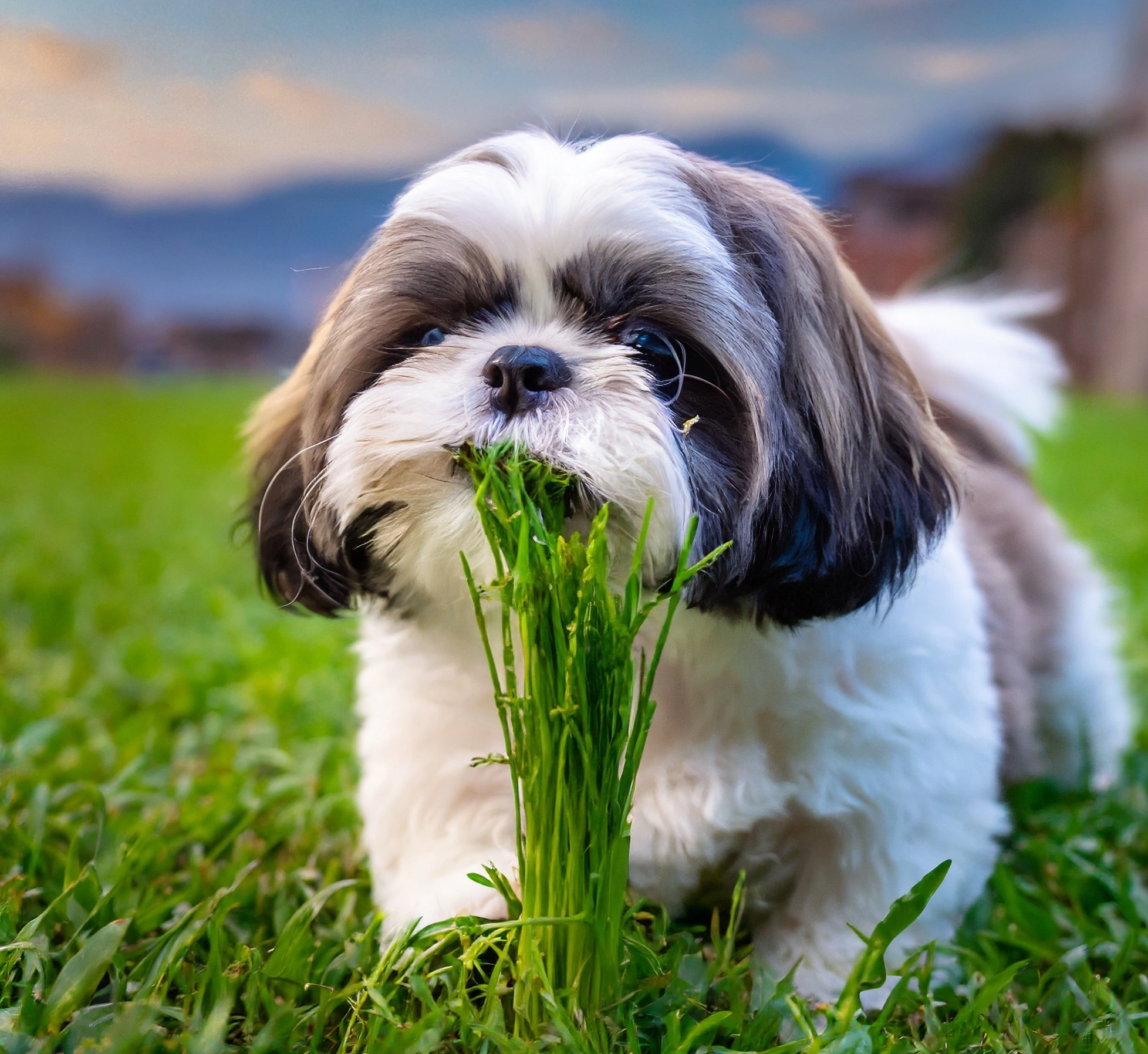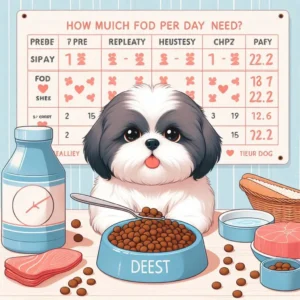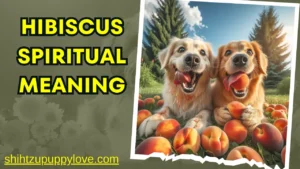Why Does Your Shih Tzu Eat Grass
Observing a Shih Tzu consuming grass may initially instigate concerns about its health. However, it is crucial to understand that this is a relatively common behaviour among this breed and other dogs. Many speculate that dogs, including the Shih Tzu, eat grass naturally to induce vomiting when they feel unwell, even though scientific evidence for this theory remains sparse.
It could also be an automatic action derived from their wild ancestors’ dietary habits, who consumed plant matter alongside their primary meat diet. Nevertheless, if this behaviour is frequent and accompanied by other abnormal symptoms, it merits an immediate consultation with a veterinarian.
Exploring the Instinctual Desire of Dogs To Eat Grass
Numerous dog owners have observed their pets eating grass at one point or another. This peculiar behaviour in dogs, which appears to be an instinctual desire, has attracted considerable scientific and academic interest. In the scientific community, the prevailing hypothesis is that dogs eat grass to induce vomiting and mitigate digestive discomfort. This theory, however, has yet to be definitively substantiated and remains a subject of ongoing exploration.
Other hypotheses posit that the dogs are compensating for a nutritional deficit or enjoy the taste or texture of grass. More research is necessary to decode this intricate behavioural pattern of dogs wanting to eat grass that our canine friends show.
Wild Dog Behaviour: An Ancestral Explanation
Wild dog behaviour, when examined from an ancestral perspective, offers a remarkable window into the ancient survival mechanisms adopted by these resilient animals. Their propensity for group living and coordinated attacks can be traced back to their ancestors, who thrived in a world marked by fierce competition and demanding environmental conditions. These inherent behaviours illustrate adaptive evolutions inclined towards cooperative hunting and communal residing, traits advantageous in the wild. This social cohesion also fosters heightened vigilance and effective defence against potential predators. By understanding wild dog behaviour in the light of ancestral roots, one can gain profound insights into survival strategies in the animal kingdom.
The Attraction of Shih Tzus to the Taste of Grass
For the taste of grass, Shih Tzus is indeed a curious phenomenon that warrants exploration. While the exact reason remains obscured, some conjecture revolves around the instinctual need to supplement their diets with additional nutrients. In contrast, others postulate it is an attempt to induce vomiting when they feel unwell. Some dogs, including Shih Tzus, may consume grass to enhance digestion or fulfil unmet dietary needs. Moreover, it could originate from their ancestral habit of grazing. This behaviour has no detrimental health impacts for dogs unless the grass is treated with chemicals or pesticides. Nonetheless, pet owners should constantly monitor their pet’s behaviour to ensure their well-being.
Canine Grazing Habits: An Unusual Dog Eating Preference?
Canine grazing habits, though unusual, are a noteworthy phenomenon in the canine world. In some cases, dogs prefer to eat grass and other greenery for reasons yet to be entirely understood by the scientific community. This pattern of food intake, conventionally associated with herbivores rather than carnivores like dogs, could be attributed to multiple factors, including dietary off-balances or a method to induce vomiting. Despite the temptation to categorize this behaviour as abnormal, it does not necessarily indicate health issues, as some suggest that it is merely part of their ancestral dietary habits. Therefore, an understanding of this preference mandates further detailed and focused study.
Understanding Why Many Dogs Like to Eat Grass
Certain canine behaviours may seem peculiar to humans, and one such habit is grass consumption. Evidence suggests this is quite a common occurrence, with most dogs ingesting grass at some point. While the exact motivation behind this behaviour remains somewhat elusive, some theories suggest that dogs might do this to induce vomiting, particularly when they feel unwell, or their stomachs are irritated. Alternately, it could be as simple as dogs finding grass palatable. However, one should monitor the animal’s eating habits; if it shows signs of distress, it is advisable to consult a vet immediately.
Are Dogs Simply Munching on Grass Because They Like It?
While it is widely observed that dogs often indulge in grass-eating, the exact rationale behind this behaviour is not categorically established. Some pet experts assert that canines might resort to this act due to a dietary deficiency, while others opine that it can be an automatic response to triggering gastrointestinal upset. However, exhibiting an inclination towards grass consumption does not necessarily imply that dogs derive a palatable satisfaction from it. It’s plausible that dogs partake in grass-eating out of boredom or simply because they need to add a bit of roughage to their diet. As such, it remains a complex subject deserving further investigation.
Investigating Possible Health Reasons Your Shih Tzu Keeps Eating Grass
Investigating the potential health-related reasons behind your Shih Tzu’s persistent grass consumption necessitates a comprehensive understanding of the breed’s characteristics and potential dietary concerns. Many health conditions – from gastric disturbances to psychological stress or boredom – can prompt a Shih Tzu to consume grass regularly. Although sporadic grass eating is a typical canine behaviour, often linked to a dog’s instinct to induce vomiting for stomach upset relief, the intense frequency can be alert to more severe health issues. Therefore, consistent observation of your pet’s habits, alongside the consultation of a professional veterinarian, is a crucial step to ensuring your Shih Tzu’s well-being well-being.
Grass-Eating and Vomiting in Dogs: Is There a Connection?
There is a widely held belief that dogs consume grass when they feel unwell, prompting them to vomit. However, several scientific studies have challenged this assumption. Research shows that only a tiny percentage of dogs exhibit sickness following grass-eating, suggesting that this behaviour is not inherently linked to vomiting. Instead, experts purport that dogs, descendants of wolves, may have a built-in propensity towards grass as part of their ancestral dietary inclinations. Nevertheless, should a dog exhibit repeated vomiting post-grass consumption, it is advisable to seek immediate veterinary intervention to rule out potential underlying health anomalies.
Intestinal Parasites and the Connection to Grass-Eating
Intestinal parasites are a pertinent concern, especially for individuals and pets frequently exposed to outdoor environments. There is a significant correlation between grass-eating and the prevalence of intestinal parasites, specifically in dogs. As these pets ingest grass, they consume any accompanying microbes or parasites. The consumed parasites may reside in the pet’s intestines, leading to various health complications. Common parasites include roundworms, hookworms, whipworms, and tapeworms, which propagate swiftly due to their prodigious reproductive capabilities. Therefore, pet owners are urged to supervise outdoor activities, provide regular deworming treatments, and maintain the cleanliness of yards to inhibit parasite colonization and safeguard their pet’s health.
Does Eating Grass Indicate an Upset Stomach in Your Shih Tzu?
Generally, it’s standard for dogs, including Shih Tzus, to graze on grass occasionally, and it does not signify any health issue. However, eating grass may indicate gastrointestinal distress if accompanied by vomiting, diarrhoea, or decreased appetite. Dogs sometimes eat grass to induce vomiting as a natural remedy to relieve an upset stomach. Nevertheless, if your Shih Tzu demonstrates repetitive grass-eating habits and other signs of sickness, it’s advisable to consult a veterinarian. The consumption of certain grasses can lead to further complications, and your dog’s persistent discomfort may be symptomatic of a more significant, more severe condition.
Can a Dog Eating Grass Be Linked to Pica Disorder?
While it is a fact that dogs often eat grass naturally, excessive indulgence could potentially suggest that the dog is suffering from a condition known as pica disorder. Pica is an eating disorder in which dogs feel compelled to eat non-food items, such as grass, in large quantities. This condition is often a symptom of dietary deficiencies and other medical conditions such as diabetes or gastrointestinal ailments. Therefore, if a dog exhibits persistent or increased grass-eating behaviour, it merits vigilant scrutiny and veterinary intervention. Ensuring that the dog’s diet is sufficiently balanced and that any underlying health issues are promptly addressed is essential.
What Do Veterinary Professionals Think About Dogs Eating Grass?
Veterinary professionals express mixed opinions regarding the phenomenon of dogs eating grass. Some vets consider it a natural behaviour that hearkens back to their wild ancestors who required more fibre in their diets. In contrast, others believe it may indicate gastrointestinal discomfort or nutritional deficiencies. It is also suggested that dogs may consume grass for boredom or simply because they like the taste. While it is not typically harmful for dogs to eat grass, it could become a concern if it leads to frequent vomiting or if the grass is treated with toxic pesticides. Therefore, vets consistently recommend monitoring grass-eating behaviour and seeking professional advice if it becomes excessive.
How to Discern If Grass Consumption by Your Shih Tzu is a Concern
Regular ingestion of grass by a Shih Tzu can be an issue deserving of your attention. While occasional grazing is expected, consistent consumption could indicate nutritional deficiencies, gastrointestinal problems, or boredom. Observing the dog’s actions and symptoms after the grass consumption is crucial. If your Shih Tzu shows signs of regular vomiting, diarrhoea, lethargy, or changes in appetite or behaviour, it would be prudent to consult a veterinary professional promptly. However, remember that some dogs eat grass solely for taste or out of habit. Thus, comprehensive observation and professional consultation are critical to discerning if this behaviour is a cause for concern.
What the Reaction of Your Dog after Grass Consumption Indicates
Canine consumption of grass can, at times, be indicative of various health conditions or behavioural measures. Often, your furry companion indulges in such behaviour to induce vomiting when experiencing discomfort in the digestive system. Gastric upset or intestinal worms are common conditions that may provoke this behaviour. However, such a pattern of grass eating can also be rooted in their inherited habits from wild ancestors who consumed vegetation for nutritional benefits. Despite these plausible reasons, chronic and frequent grass consumption calls for immediate vet consultation to rule out possible health issues. Additionally, it is crucial to ensure the grass they consume is free from harmful pesticides or chemicals.
Observing Changes in Behaviour in Your Shih Tzu Post Grass-Eating
Observing changes in your Shih Tzu’s behaviour after grass-eating is crucial as it might provide valuable signals about its overall health condition. Although it is common for dogs to indulge in this behaviour, frequent and excessive grass-eating might indicate an underlying gastrointestinal issue. A Shih Tzu that vomits or displays lethargy, diarrhoea or other signs of discomfort after consuming grass should alert its owner to potential complications. It is, therefore, advised that the pet’s well-being and well-being be regularly monitored following such incidents. In case of persistent abnormal behaviour, a vet consultation should be sought immediately to diagnose the cause and prescribe the necessary treatment accurately.
Understanding When to Visit an Animal Hospital over Grass-Eating
Understanding when to visit an animal hospital due to your pet’s grass-eating habits is crucial for ensuring their health and well-being. Contrary to popular belief, occasional grass consumption by canines or felines does not necessarily indicate illness. This behaviour can be part of their instinct to induce vomiting when feeling unwell or merely an exploration of their surroundings. However, it becomes a concern when accompanied by abnormal signs such as persistent vomiting, diarrhoea, loss of appetite or noticeable discomfort. In such instances, visiting a trusted animal hospital to consult a qualified veterinarian is paramount to diagnosing any underlying conditions and providing the necessary treatment and care.
Recognizing Signs of Boredom Leading to Eating Grass
Recognizing signs of boredom that lead to eating grass is integral in maintaining optimal health, particularly in pets. Animals like dogs may engage in this behaviour to mitigate their lack of stimulation. Boredom in pets often manifests through restlessness, increased sleep, and strange behaviours, like grass consumption. While occasional grass ingestion is not a concern, consistent behaviours may indicate more severe health issues or deficiencies in their diet. It, therefore, behoves pet owners to monitor their pets’ activities, provide balanced nutrition and adequate mental stimulation, and consult with a veterinarian where unusual eating habits persist.
Evaluating If Grass Eating Is Affecting Your Dog’s Health
Properly evaluating your dog’s dietary habits is crucial in preserving its health. If your dog consumes grass regularly, it may raise concerns about its well-being and well-being. Although occasional grass eating is considered normal canine behaviour, frequent consumption might suggest nutritional deficiencies or gastrointestinal issues. Possible causes may include a lack of fibre, feelings of nausea, or a need to induce vomiting. It is, however, pertinent to consult a certified veterinarian if such behaviour persists, as the ingested grass could also carry harmful parasites or pesticides. Remember, your pet’s health should always be your utmost priority.
Evaluating the Role of Grass Type in Influencing Your Dog’s Eating Habits
The dog’s habit of eating grass can differ significantly based on the type of grass available in their environment. Conducting a proper assessment of this element is vital to understand better the dogs’ possible reasons for their inclination to eat grass. Recent scientific studies have shed light on the notion that dogs may display a biased preference towards some grass species over others due to taste, texture, or potential health benefits. Understanding this selective behaviour in dogs towards specific grass types can significantly enhance our ability to cater to their nutritional needs and ensure well-being. Therefore, conscientious pet owners must invest efforts in researching and discerning the implications of different grass types on their dogs’ eating habits.
Do Dogs Pick the Grass They’re Eating?
Many pet owners have observed their dogs eating grass and often wonder if dogs selectively choose which grass to consume. Scientific studies to evaluate this behaviour are relatively scarce. However, anecdotal evidence suggests that dogs may select particular types of grass based on texture, palatability, and potential medicinal value. Dogs often exhibit this behaviour to induce vomiting when they feel unwell. Pet owners should monitor this behaviour and consult a veterinarian if it becomes frequent or excessive since it could indicate underlying health issues. Therefore, while dogs may prefer grass consumption, their exact selection criteria remain largely unknown.
The Impact of Pesticides on Your Shih Tzu’s Attraction to Grass
The use of pesticides on lawns and grassy areas can have a profound impact on your Shih Tzu’s attraction to grass. Pesticides contain complex chemical compositions that, while effectively controlling pest infestations in your green spaces, may also emit particular scents or flavours that could attract or repel your pet. These chemicals, however, may pose significant health risks to your Shih Tzu if ingested, inhaled, or come into contact with their skin. Therefore, while your Shih Tzu’s attraction to grass treated with pesticides may seem harmless, it is essential to exercise caution to protect your pet from potentially harmful pesticide exposure.
Understanding Why Your Dog May Prefer Some Types of Grass over Others
Canine behaviours can often stimulate curiosity, including their possible preference for certain types of grass. Several contributing factors can influence a dog’s tendency to favour one type of grass over another. One consideration is the grass’s texture and height, which can induce or discourage specific behaviours like rolling or lying down. Nutritional or dietary considerations could also play a role, as some grass varieties contain essential vitamins or minerals that canines might crave. Dogs’ instinctive habits, such as marking territory or searching for a suitable place to defecate, could further explain their grass preferences. It is essential to monitor such behaviours as certain grass types may have undergone treatments with pesticides that could be harmful if ingested.
Does The Grass in Particular Environments Trigger Grass Eating in Dogs?
Research on pet behaviour suggests that specific environmental conditions may influence the consumption of grass by dogs. Although grass-eating in canines is generally considered an expected behaviour regardless of the dog’s dietary habits, scientific studies propose a potential correlation between the type of environment and the frequency of grass consumption. Dogs in suburban areas, exposed to lusher, healthier grass types, are reported to ingest grass more frequently. Additionally, dogs may seek grass for its natural nutrients and as a dietary supplement, which is more prevalent in fresher, untainted grass found in less urban environments. Therefore, the environment does influence this particular instinctual behaviour in dogs.
Does Variety in Dog Food Influence Their Desire to Eat Grass?
Research on canine behaviour and dietary habits shows a correlation between the variety of dog food and their inclination to consume grass. Dogs often eat grass due to nutritional deficiencies, particularly fibre, which needs to be adequately provided in many commercial dog foods. Incorporating a diverse range of high-quality food rich in essential nutrients, including fibre, into their diet can reduce this behaviour. However, some experts argue that dogs eat grass instinctively, not because of an unbalanced diet. Thus, while providing a variety of dog food might influence some dogs’ desire to eat grass, it may only eliminate this behaviour partially due to instinctual factors.
What You Can Do to Curb Your Shih Tzu’s Grass Eating
If you notice your Shih Tzu developing a habit of consuming grass, it is paramount to intervene promptly to prevent potential digestive issues. A balanced, highly nutritious diet is critical in discouraging this habit, as grass eating sometimes arises from nutritional deficiencies. It’s worthwhile to consult an experienced veterinarian for advice on a suitable diet regimen for your pet. Another effective strategy involves enriching your Shih Tzu’s environment with chew toys and stimulating activities to distract them from grass-eating tendencies. Lastly, well-supervised outdoor time can also reduce the inclination to eat grass, ensuring you guide your pet towards healthier behaviours.
How Can You Stop Your Dog from Eating Grass?
Taking a proactive approach to deter your dog from eating grass is crucial. This commences with a professional veterinarian examining the pet’s nutrition. Indeed, dogs often consume grass due to deficiencies in their diet; they seek out grass as a source of fibre when their usual food doesn’t provide enough. Therefore, implementing a balanced, dog-optimized diet that caters to your canine’s health requirements can mitigate this behaviour. Additionally, ensuring your dog gets regular exercise and mental stimulation is an effective way to divert their attention away from grass-eating. Above all, contact a veterinarian if the habit persists despite these interventions.
Can Keeping Your Dog Occupied Prevent Grass Eating?
Research has shown frequent engagement and activity can deter dogs from indulging in grass-eating. One prevalent theory proposes that this behaviour may be caused by boredom or anxiety, situations that can be appropriately managed by allocating time for regular exercises and developing a stimulating environment. Introducing a diverse assortment of toys and scheduling routine walking or playing sessions may help curtail this vegetation consumption habit. However, it is crucial to understand that infrequent grass eating is generally harmless and may indicate dietary needs. If the behaviour becomes extensive or compulsive, it is recommended to seek advice from a reputable Veterinarian.
Effective Ways to Safely Keep Your Dog Away From Grass
Maintaining the safety and well-being of your pet is paramount when considering home improvement and garden management practices. If you are seeking to ensure your dog is deterred from accessing the grass, there are several effective strategies one might employ. Barrier methods such as erecting fences or creating designated dog-friendly zones can offer reliable results. Furthermore, training your dog to avoid certain areas is another feasible prospect. Specifically, using positive reinforcement techniques can foster obedience. Lastly, integrating safe yet deterring scents, like vinegar, can discourage a dog’s presence in unwanted areas without causing any harm. However, always consult with a professional animal behaviourist for personalized solutions.
The Role of Diet Modification to Curb Your Dog’s Grass Munching
Modifying your dog’s diet can play a significant role in curbing its grass-munching habits. Specific dietary changes might resolve the issue, such as incorporating more fibre or trying out a different brand of dog food that includes healthy and needed nutrients. It is often believed that dogs eat grass when their regular diet lacks certain nutrients. Thus, ensuring their food is balanced and nutritionally complete could deter this behaviour. However, remember that your dog’s persistent desire to eat grass might indicate a more severe hidden health issue. If your dog continues to consume grass even after dietary adjustments, it is advisable to seek advice from a veterinarian.
Tips for Pet Owner: Shifting Your Dog’s Attention Away from Grass
As a pet owner, keeping your dog’s attention away from the grass can often be challenging, especially if they have developed an undue interest in it. The critical steps involve redirection and rewarding the dog’s compliance. Try to distract your dog by exhibiting more exciting activities, such as playing fetch or participating in a training session. Further, utilizing treats can incentivize your dog to obey commands and refocus their attention on you. Furthermore, it is essential to include regular vet check-ups to ensure your dog isn’t eating grass due to dietary needs or health-related matters. Implementing these strategies will foster a healthy and engaging environment for your beloved pet.
Conclusion:
We’ve journeyed through instinctual behaviours, nutritional needs, and environmental influences and addressed common concerns. Remember, a grass-munching Shih Tzu is embracing their natural tendencies. By understanding and embracing their quirks, you’re fostering a deeper connection with your beloved furry companion.
Why Does Your Shih Tzu Eat Grass: Frequently Asked Questions
Q1: Is grass safe for my Shih Tzu?
Absolutely! In Grass Safety 101 for Shih Tzus, we assure you that, when consumed in moderation, grass is generally safe for your furry friend.
Q2: How can I discourage this behaviour?
Learn practical strategies in Curbing Grass Eating: A Guide for Shih Tzu Owners, ensuring a healthy and happy pet-parent relationship.
Q3: Could it be a sign of an underlying health issue?
Explore potential health concerns with Shih Tzu Health Check: Beyond Grass Eating, ensuring your pet’s well-being exceeds their culinary choices.
Q4: Should I change my Shih Tzu’s diet?
Unlock dietary insights in Dietary Adjustments: Tailoring Meals for a Happier Shih Tzu, promoting optimal health for your four-legged friend.
Q5: Can grass consumption lead to digestive issues?
Address concerns about digestive health in Digestive Dilemmas: Navigating Grass-Related Concerns, ensuring your Shih Tzu’s tummy stays happy.
Q6: Are there alternatives to curb grass-eating?
Discover effective alternatives in Grass Alternatives: Keeping Your Shih Tzu Content, offering your pet satisfying options beyond the green blades.


















Post Comment